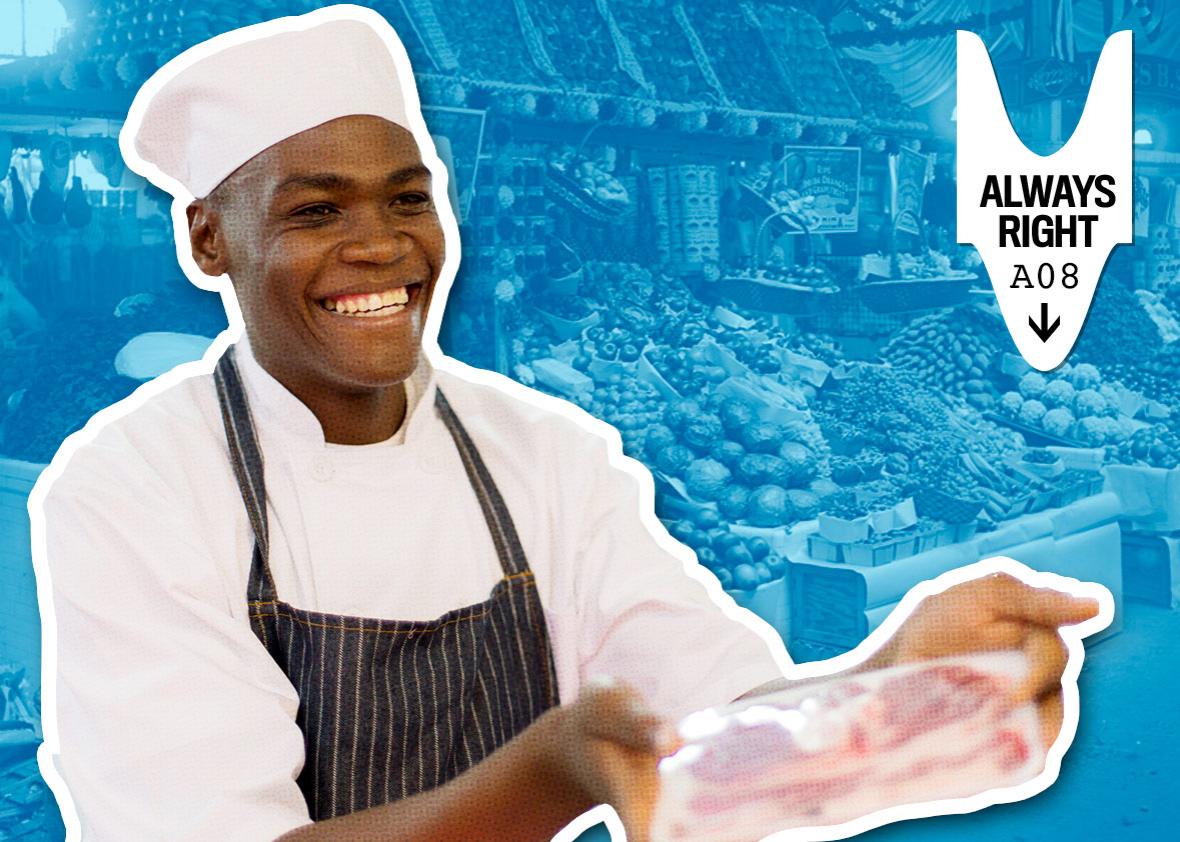Always Right is Slate’s pop-up blog exploring customer service across industries, technologies, and human relationships.
One of the things I love most about my small town is our grocery store. The prices are low and the selection is decent. But it’s the customer service at Market Basket that makes picking up milk and broccoli such an agreeable errand. As in many retail settings heavy on entry-level jobs, a fair proportion of Market Basket’s employees are teenagers. But these teens aren’t surly or inept or mumblingly awkward like the ones at Cinnabon. These bright young things make friendly eye contact, they dress neatly, and they make pleasantly professional small talk. When I was visibly pregnant a few years ago, baggers walked me out to my car, helped to load my bags, and whisked away the cart afterward. These days they greet my toddler by name in the store. This is Generation Z as if designed in a lab by Greatest Generation scientists.
Now, I’ve been to other stores with some perfectly adequate teenage employees, but how does Market Basket ensure that all their teens are so freshly scrubbed and gung-ho? When I asked the company’s operations supervisor, Joe Schmidt, about its training procedures, I half expected a secret formula: an intense indoctrination program, a complex mentoring system, military-style bagging drills. Instead, he described a one-day orientation, a detailed employee handbook, and corporate “core values” that put customer service first. It all sounded reasonable enough, but it didn’t quite explain why my unremarkable New England supermarket feels like the set of Pleasantville.
As it turns out, one secret to making a good teenage employee is simply employing a teenager. When I reported on teenage employment a few years ago, experts told me over and over how having a job is an invaluable tool for teaching young people “soft skills” like dependability and communication. Employers tend to be much less forgiving of attendance problems than schools are, and the workplace is often the first time teenagers are expected to interact as equals with adult supervisors and customers. Entry-level customer service jobs are where many teens first absorb the kind of basic life skills that make them employable in other fields later—and more pleasant to be around in the meantime. Hiring them is exactly what turns them into people you’d want to hire.
I was 14 when I got my first real job, working the counter at a snack bar on a college campus near my home. Yes, I learned how to operate a cash register and how to reheat the vat of old nacho cheese. But the real skills the job imparted were intangible: I had to learn how to respond to people who had special requests and obscure questions, reasonable and unreasonable. Some were grouchy for reasons that weren’t my fault, and sometimes for reasons that were my fault; they required cheerful on-the-spot solutions either way. In the next few years, those skills were honed further at a series of full-service restaurant jobs, which raised the stakes. Critics point out that tip-based systems end up privileging white men as customers and create a variety of other structural problems. All absolutely true, but I got a real charge out of hustling for tips. When you work for tips, you literally receive cash in proportion to your social expertise—the ability to quickly “read” a group of people and provide the exact style of service (chatty, speedy, flirty) that suits their needs. This was sometimes wildly satisfying, and other times stressful or humiliating. In other words, it was a lot like the rest of my working life would be.
If service-oriented jobs are where teenagers learn to be adults, it’s disturbing, then, that the teenage employment rate has dropped dramatically. In 2000, 46 percent of 16-to-19-year-olds had a job in any given month. Last year, just 30 percent were working. That slump is happening for several reasons, including the decline of entry-level jobs and the fact that more adult workers are resigning themselves to low-paying service work. Meanwhile, white teenagers and those from higher-income families are notably more likely to have jobs. In 2017, the after-school job is becoming a luxury experience.
There’s a risk to fetishizing teen employment as some kind of assembly line for producing cheerful, obedient capitalist drones. But for the teenagers who may not have their first real job until they’re in their 20s, the trend could have real consequences. “This is the first generation that will not have major work experience as part of their adolescent development,” Jeylan Mortimer, a sociologist at the University of Minnesota, told me back in 2014. “This raises major concerns.”
Which brings me back to Market Basket. Schmidt, the company’s director of operations, started working for the company at 14 as a bagger at a store in Danvers, Massachusetts. He worked there throughout high school and college, and made it a career after he graduated. He has now worked for the company for 31 years, and he’s proud that it’s a place that tries to make every employee feel important. “It’s my first job and hopefully my last job,” he said. Schmidt was an amiable, knowledgeable, and helpful guy. Perhaps he learned it on the job.
